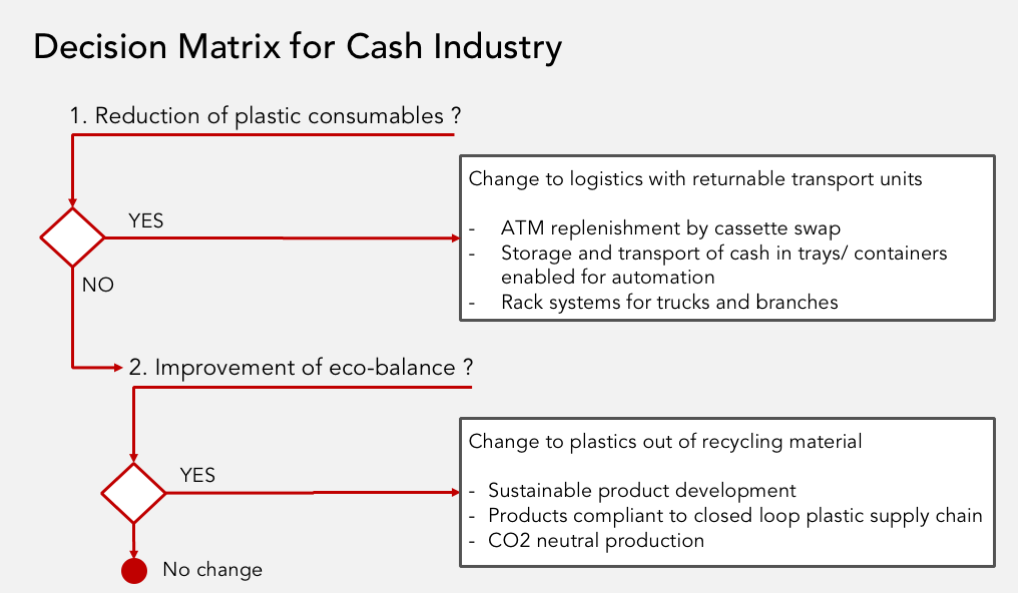Across the world, governments are taking control of the plastic pollution problem, bringing in either complete bans on plastic foils and bags, or bans on specific type of plastic. The cash industry should pay attention to this fact, regarding the use of single-use plastic consumables like safe-bags, coin sachets and at last packaging materials like shrinking foils.
Plastic is an important and ubiquitous material in world’s economy and although it is made out of depletable resources, it is comparatively cost-efficient. But there is an urgent need to tackle the environmental problems. Therefore, governmental „green policies“ require a reduced consumption, a transformation from single-use to re-use and a change in production for a strict recyclability of plastic products. Using more recycled plastics can curb litter, dependence on the extraction of petroleum for plastics production and reduce CO2 emissions.
These new governmental policies will increase costs for plastic consumables in cash industry and change the view to alternative packaging models for banknotes and coins.
Countries with plastic ban
In an effort to reduce unnecessary plastic waste, some countries in Africa, Asia, Australia and some States in North America have placed bans on single-used plastic bags as a first step. The main driver behind bag bans is to lower how much plastic finds its way into the marine eco-system.
Countries with promoted change to biodegradable plastics
Several countries in the Middle East try to solve the pollution problem by encouraging the distribution of oxo-biodegradable plastics, and Saudi Arabia has even made their use for plastics consumables mandatory.
They state, that the measures protect citizens and the environment. But the available evidence suggests, oxo-biodegradable plastics do not achieve what their producers claim. Oxo-biodegradable implies not, that the plastic is compostable. It requires high temperatures in industrial facilities to compost. Due to additives, oxo-biodegradable plastics in environment contribute to micro-plastic pollution. Furthermore, oxo-biodegradable plastic cannot be part of a recycling economy with conventional plastic. And before there is no critical mass of oxo-biodegradable plastic in circulation, a specialized recycling is not cost-competitive. For cash handling, these materials are not proven for suited processing conditions and for longer-term storage in comparison to current packaging standards in shrinking foils or bags for notes and coins.
EU countries for recycling strategy
The strategy for the European Union (EU), published by the European Commission (EC) in January 2018, focuses a high-quality recycling economy of conventional plastics. The strategy targets to an innovative and sustainable plastic industry, where design is optimized to less material consumption without additives, e.g. heavy metals or plasticizer and production fulfills recycling standards including a high rate for re-use of all kind of plastics.
In EU countries, approx. 500 to 600 Mio. safe-bags are annually used. The packaging industry reacts accordingly and provides safe-bags and shrinking foils out of production with recycling material rate of 80% for a sustainable cash handling process.
Change to new logistics with returnable transport units
Considering that single-used plastic bags and foils must be strongly reduced, the cash industry should direct its view to returnable logistics units. Like in ATM cassettes, the banknotes can be packed loose or in packets or bundles into cash containers for storage and transportation. Such processes eliminate shrink-wrapping of notes or coins and further packaging into safe-bags. The cash shipments in safe-bags can be replaced by transport of closed and controlled cash containers or trays between the cash players.
The change from safe-bags to returnable logistics units is newly affected by
- governmental policies and its impact on price levels for safe-bags and foils
- degree of process automation (e.g. automated storage and retrieval systems demand cash containers or trays, safe-bags need an additional tray for automation in cash centers)
- recirculation rate of returnable transport units in a period
Several Central Banks will adapt their cash cycle strategy in future and have to decide about logistics concepts including appropriate packaging and transport standards respecting green policies. This impacts the set-up of cash infrastructure for cash centers and transport based on the utilization of one-time, non-reusable bags or returnable containers. An evaluation of end-to-end process costs and of respective eco-balances supports such decisions.
Do you want to know more about regulations for cash industry and their adaption to cash infrastructure, please contact us.
Sources: European Commission, plastic strategy from Jan. 2018; Saudi Arabian Standards, Metrology and Quality Organization (SASO), regulations from July/ Dec. 2017; Dame Ellen MacAthur, lecture at World Economic Forum Davos 2016 and 2017; Leon Kaye in TriplePundit, Nov. 2017; Erin Riskey in Study.com, Nov. 2017





